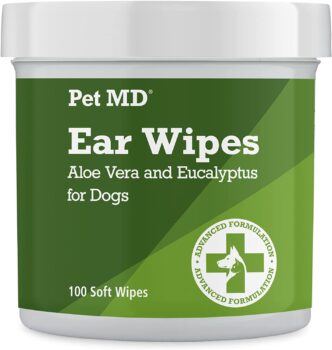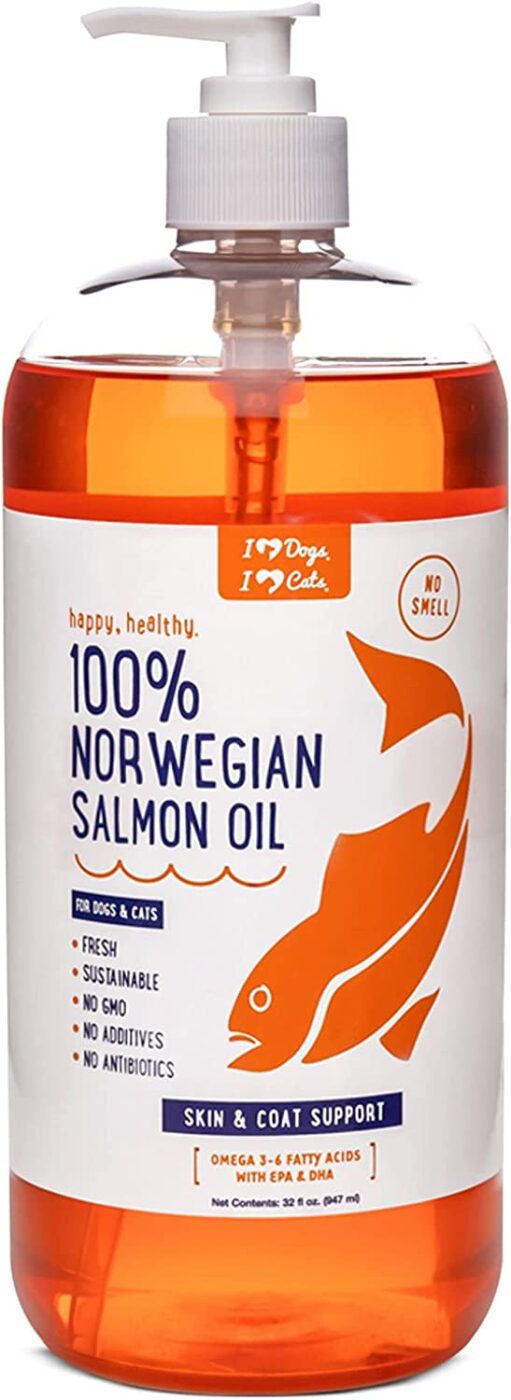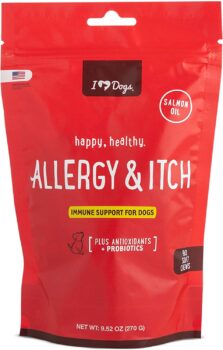Known for their impressive speed and lean, muscular bodies, Greyhounds are noble and affectionate dogs. Although they aren’t commonly predisposed to ear infections, these conditions can occur and warrant timely intervention. This article will explore 11 strategies to treat and prevent ear infections in Greyhounds, with a special emphasis on the benefits of Omega-3 fatty acids in their diet to combat allergies.
iHeartDogs is reader supported. Some of the links below may be paid affiliate links, where we receive a small commission on a product at no additional cost to you.
1. Regular Ear Checks and Cleaning
Regular checks and cleaning of your Greyhound’s ears are paramount. Use a vet-approved ear-cleaning solution to maintain hygiene and prevent the build-up of bacteria and yeast.
Our favorite ear cleaner is these PetMD brand ear wipes on Amazon.
2. Dry Ears Thoroughly
Moisture can create a favorable environment for bacterial and yeast growth. Ensure your Greyhound’s ears are dry after baths, swimming, or wet weather.
3. Regular Veterinary Check-ups
Regular vet check-ups can help in early detection of infections, increasing the chances of successful treatment and preventing complications.
4. Follow the Vet’s Instructions
If your Greyhound is diagnosed with an ear infection, ensure you follow your vet’s medication regimen and advice strictly. This adherence is crucial for effective treatment and to prevent recurrence.
5. Monitor Diet
Some Greyhounds may have food allergies, which can trigger inflammation and lead to ear infections. Consult your vet about possible dietary changes if you suspect this could be an issue.
6. Include Omega-3 Fatty Acids in the Diet
Omega-3 fatty acids have anti-inflammatory and immune-boosting properties, which can help fight allergies. Adding a source of Omega-3, like fish oil, to your Greyhound’s diet can reduce the risk of ear infections.
We’re fans of this Norwegian salmon oil on Amazon. It’s a bright orangish-pink color and has no fishy smell at all due to it’s ultra high purity.
7. Avoid Known Allergens
If your Greyhound has known allergens, it’s best to eliminate these from their environment. Common allergens include certain foods, pollen, and dust mites.
A few good supplements to help your dog’s allergies are apple cider vinegar, quercetin, and colostrum, all of which are found in many natural allergy supplements like this one.
8. Consider Immunotherapy
For Greyhounds with recurrent ear infections due to allergies, your vet may recommend immunotherapy. This treatment involves controlled exposure to allergens to help your Greyhound build up immunity.
9. Maintain a Healthy Weight
Regular exercise and a balanced diet can help maintain your Greyhound’s ideal weight. Obesity can increase the risk of ear infections.
10. Use Dog-Specific Ear Care Products
Use only dog-specific, vet-approved products when cleaning your Greyhound’s ears. Human products may not be suitable and can cause harm.
11. Surgical Intervention
In severe or recurrent cases, surgery might be considered to improve aeration in the ear canal. This is usually a last resort when other measures have failed.
Frequently Asked Questions (FAQs)
- Why might Greyhounds get ear infections? Greyhounds can get ear infections due to a variety of reasons, including bacteria, yeast, allergies, and trapped debris in their ears.
- What are the signs of an ear infection in my Greyhound? Symptoms can include frequent head shaking, scratching at the ears, redness, swelling, unusual odor, and discharge from the ears.
- How often should I clean my Greyhound’s ears? As a general rule, clean your Greyhound’s ears once a week. If your dog is prone to infections or has a current infection, your vet may recommend a different schedule.
- How does diet impact my Greyhound’s ear health? Diet can play a role in your dog’s overall health and immune function. The inclusion of Omega-3 fatty acids can help fight inflammation and allergies, reducing the risk of ear infections.
- Are ear infections serious in Greyhounds? If left untreated, ear infections can lead to chronic pain, hearing loss, and further complications. It’s essential to seek veterinary care if you suspect an ear infection.
- Can I use human ear-cleaning products for my Greyhound? No, always use dog-specific, vet-approved products for cleaning your Greyhound’s ears.
- How can Omega-3 fatty acids benefit my Greyhound? Omega-3 fatty acids have anti-inflammatory and immune-boosting properties, helping to reduce the risk of ear infections.
- What type of exercises are suitable for my Greyhound? Greyhounds enjoy sprinting and require short bursts of exercise rather than long endurance activities. A fenced yard or leash walks are good options.
- Can ear infections in Greyhounds be permanently cured? With good ear care and preventative measures, the frequency and severity of ear infections can be significantly reduced. In some cases, a vet may recommend surgical intervention.
- How can I tell if my Greyhound has an allergy? Symptoms of allergies can include excessive itching, redness, swelling, digestive issues, and recurrent ear infections. If you suspect your Greyhound has an allergy, consult your vet for testing and treatment.
In conclusion, a healthy lifestyle, dietary enhancements with Omega-3 fatty acids, regular ear care, and proactive veterinary visits are crucial in preventing and treating ear infections in Greyhounds. With these strategies, your Greyhound can lead a comfortable and healthy life.




 Toledo, United States.
Toledo, United States.